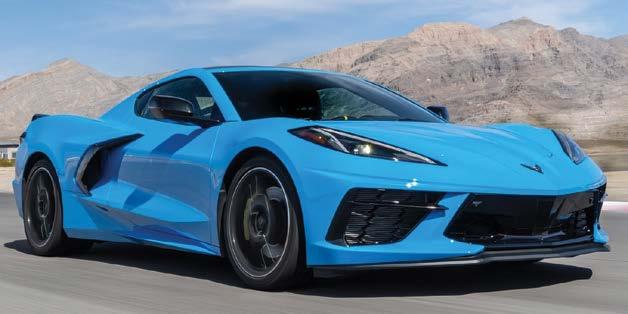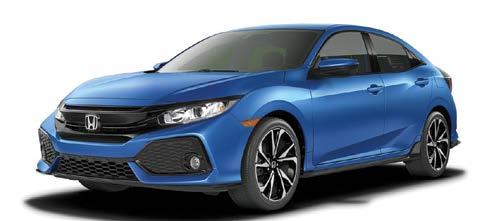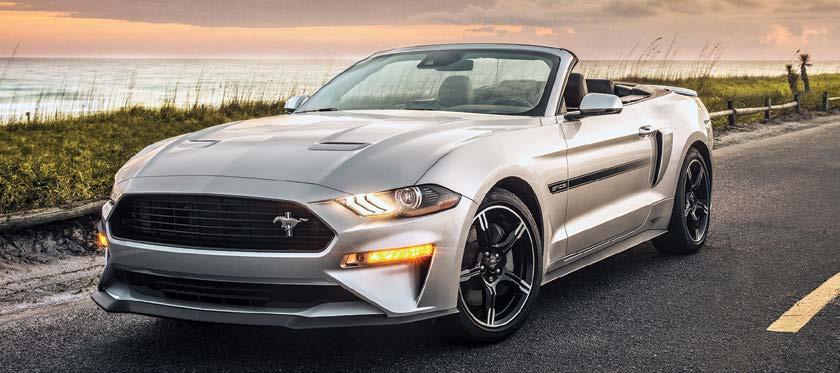
7 minute read
is Impacting the Industry
The California Autobody Association (CAA) recently held a one-hour Zoom meeting with the California Department of Insurance (CA-DOI), covering a handful of topics of interest to the entire membership.
One particular subject that has been a pebble in CAA’s shoe for several years was brought up again during the meeting. You might be thinking that pebble was illegal steering, but you’d only be half right.
When we talk about steering in this industry, it’s usually about insurers trying to persuade consumers to take their vehicles to DRP shops, because those shops offer the insurer more attractive labor rates, and in many cases, a promise to use the lowest priced parts available.
Instead, this is about “parts steering.” Parts steering is where insurance companies search a multitude of different online vendors scattered across the country to find each part at the lowest price, and then cap payment on their estimate based on that price. Sound reasonable?
Monte Etherton, chairman of the CAA State Legislation Committee and state board member of CAA’s San Diego chapter, has been monitoring this situation for years and doesn’t think it’s reasonable at all.
“Here’s an analogy,” he said. “Your 8-year-old car needs some work, so you take it to the dealer and they give you an estimate for $3,500. You tell them you’ll get back to them. Their estimate lists five parts that total $2,000 of the $3,500. Since you want to save some money, you start scouring the internet for those parts.
“You find the cheapest parts from five different online stores, and all offer free shipping. Buying those parts instead of the parts from the dealer will save you almost $500. You make a neat list of all the store’s phone numbers and the prices and take it back to the dealer and ask them to buy the parts they need from those places so you can save some money. What do you think they would do?”
Etherton cites “parts steering” as a major problem in the industry.
“Some insurance companies will only pay us based on the price of the cheapest parts, so they are literally forcing us to buy certain parts from their vendors or lose money,” he said.
“I did one job on a Volkswagen where the insurance company’s estimate had an aftermarket headlight from an out-of-town vendor, because it was cheaper than my local aftermarket supplier,” Etherton said. “I emailed them that they can’t require me to buy a part from a specific supplier, and they replied with this fallacy: ‘We can’t tell you where to purchase your parts, but we don’t owe more because you select a different vendor.’”
In 2018, CAA received a written legal opinion from the CA-DOI in response to questions regarding several industry problems, including parts steering. Two paragraphs from the opinion explain how parts steering is related to customer steering, which is illegal in California:
“No insurer may require that an automobile be repaired at a specific automobile repair shop. (Cal. Ins. Code §758.5(a)). If the claimant elects to have the vehicle repaired at the shop of his or her choice, the insurer may not limit or discount the reasonable repair costs based on charges that would have been incurred had the vehicle been repaired by the insurer’s preferred shop. (Cal. Ins. Code §758.5(d)). As a result, by refusing to pay any reasonable price for a replacement part that is higher than the price quoted by the insurer’s preferred parts vendors, the insurer is limiting or discounting the reasonable repair costs based on the charges that would have been incurred had the vehicle been repaired by the insurer’s chosen repair shop thereby preventing customers from using the repair shop of their choice and preventing the policyholder from using any shop other than those shops that purchase their replacement crash parts from the pre-
Your Trusted Source for GM GENUINE PARTS
in the North Florida and Georgia



HOURS: M - F 7-6 SAT 8-4

Order Through the Parts Networks, Phone or e-Mail Over 100+ Years Combined GM Wholesale Parts Experience Competitive Pricing and Discounts
Wholesale Parts Direct Line: (850) 580-7658
Your Local Parts Dealer
Fax: (850) 574-2034


Competitive PricingCompetitive Pricing Free and Free and Fast DeliveryFast Delivery Knowledgeable Wholesale Parts Staff
Hendrick Honda Pompano Beach 5381 N. Federal Hwy. Pompano Beach, FL 33064
PH 954.425.8244
Start something special.
Mon-Fri 7:00am-6:00pm Sat 7:00am-5:00pm
ferred parts vendors of the insurer.
“Limiting or discounting the reasonable repair costs based on the charges that would have been incurred had the vehicle been repaired by the insurer’s chosen repair shop is a violation of Insurance Code section §758.5(b) (3) and would constitute a violation of the Unfair Insurance Practices Act. Cal. Ins. Code §758.5(f). That is, if an insurer limits or discounts the reasonable repair costs based upon the replacement part prices available from a certain parts vendor, the insurer would effectively prevent a customer from using the automobile repair shop of his or her choice in violation of Insurance Code section 758.5(b) (3). An insurer would, however, be permitted to reasonably adjust a collision repair shop’s written parts price estimate for any part, including new OEM crash parts, if the insurer demonstrates that the price charged by the repair shop for the replacement part is “unreasonable.” 10 CCR §2695.8(f).”
This opinion was also a topic of the Zoom meeting. Both the DOI’s deputy commissioner and the
Miscategorized Parts
There is another facet to this problem. In California, the law requires shops only list parts on their estimate as new, used, reconditioned, rebuilt, an OEM crash part or a nonOEM aftermarket crash part. Insurers are also supposed to follow these regulations when writing estimates, but some do not.
“A few months back, we had a 2021 Mercedes in the shop,” Etherton said. “It only had 1,000 miles on it and was hit pretty hard in the right suspension. The customer’s insurer specified 13 used, non-OEM or reconditioned parts from six different vendors located in California, Texas, Michigan and Oregon. The parts’ prices ranged from about $10 to $1,000.
“Some of the part descriptions were really questionable, like a reconditioned upper control arm and a reconditioned engine cradle, and a used wheel that was also refurbished. By law, we have to be crystal clear about parts with our customer, but how can I do that if I don’t even know what they are?” Etherton continued. “And none of these parts had a manufacturer’s warranty, something we would get if we bought them from the dealer. We ended up losing that job because we believed new genuine factory parts belonged on that car, and the customer didn’t want to pay the difference. She did tell me she was changing insurance companies though.”
The Difference Between Opt-OEM Parts and Genuine OEM Parts
Many parts on insurers’ estimates have been miscategorized with such terms as “alt-OEM”, “opt-OEM” and “surplus-OEM.” In reality, these parts may be over-production, blemished or damaged OEM parts. One thing they all have in common is none of them carry the original car manufacturer’s warranty.
Every part sold by every vehicle manufacturer has a manufacturer’s suggested retail price (MSRP), which is the price a shop charges for the part. In contrast, opt-OEM parts do not have an MSRP, only a cost. When a part does not have an MSRP, insurers will allow a “markup,” usually 20%.
Etherton thinks he knows how opt-OEM came into existence.
“Let’s say a shop buys a bumper from a Chevy dealer that has an MSRP of $200, and the shop gets it for $140 wholesale. The shop will make a $60 profit,” he said.
“Let’s also say an opt-OEM vendor—maybe a wrecking yard— has bought 50 of those bumpers on the gray market for $120 each. They offer the bumper to insurers for $150. The insurer marks the part up $30—20%—for the shop. The insurer now gets the $200 bumper for $180, but the shop loses half their profit, the shop’s Chevy dealer loses a sale and the customer loses the Chevy factory warranty because the shop didn’t purchase the part from the dealer. Who wins here?”
Another issue is some vendors are mislabeling their parts to gain an advantage with insurers.
“Something else we see is when the vendor lists a bumper cover as a used part when it’s actually a new


• OE COLLISION PARTS, MECHANICAL REPAIRS AND HEAVY REPAIRS PARTS • SPECIAL PRICING FOR COMPETITIVE COLLISION AND MOTORCRAFT PARTS • EXPERT COUNTER LOOK-UP WITH MASTER CERTIFIED COUNTERMAN










